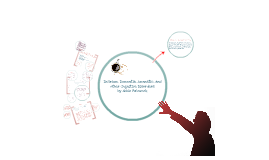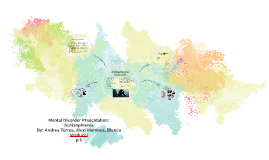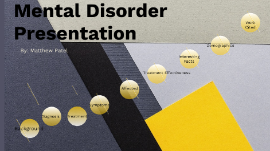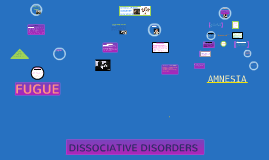Mental Disorder Presentation
Transcript: DISSOCIATIVE DISORDERS AMNESIA A common plot device in movies or on television is when someone get amnesia and then has no sense of who they are anymore. Does this happen generally to people who have amnesia in real life? Dissociative Amnesia is more common in men than in women. *Two or more distinct identities or personality states must be present and recurrently take control of the person's behavior. *Since in most cases Fugue is brought on by a traumatic event, its necessary for them to deal with the event in order to recover *Fugue could be linked to severe stress or might be a result of a traumatic event DIAGNOSES AND TREATMENT *They may also have problems with daily functioning (due to episodes) and have extreme distress *it refers to the loss of memories, which can include facts, information, and experiences Dissociative Identity Disorder (DID) TREATMENTS!! *Relatively rare disorder, that tends to increase during stressful or traumatic periods What are some different types of Amnesia? *People with amnesia usually know who they are and are lucid *Treatments may involve long-term therapy or counseling, individual psychotherapy, or medications *In some cases patients will never recover from their amnesia *May be able to recall experiences from their childhood or know past presidents but not current ones and might not remember the month or even what they ate for breakfast *People with DID literally dissociate themselves by creating two or more personalities in order to cope with a situation or experience too traumatic, violent, or painful to assimilate with their conscious selves *However, people will remember who they are and recognize people they know well SYMPTOMS *having highly distinct memory variations, which fluctuate with the person's split identities *Disturbances are not due to a general medical condition or an effect of a substance use *May have the inability to recall key personal information, that is much more that forgetfulness *they may experience the inability to recall past events, important information from their lives *Their recall of important personal events is too extensive to go beyond ordinary forgetfulness *Use or abuse of alcohol and certain drugs may also be factors What is it ??????? *recent memories are most likely to be lost, however old ones may be spared * It is a sudden, temporary episode of memory loss *People with this amnesia may also drawn a blank to events that happened a day, a month or even a year ago ACTUALLY IT IS FICTION!!!!! *when a person has the presence of two or more distinct personality states or split identities that continually have the power over the persons behavior *Lot of people will experience problems with short-term memory, new information will not be retained *May have the inability to recall past events and previously familiar information (Retrograde) *Memories can be recovered on their own sometimes or memories may be triggered by something in their surroundings *Can involve Psychotherapy Some may include: There are many causes of amnesia, every cause resulting in something slightly different. What causes amnesia ????? *People with fugue may also create new identities, because they are often confused as to who they are SYMPTOMS *A person may go on a sudden unplanned travel *A disorder in which the person suffers from severe dissociation and they are able escape reality in ways that are involuntary and unhealthy * it is also called Amnestic Syndrome AMNESIA DIFFERENT TYPES OF AMNESIA CAUSES What is Fugue? Is Amnesia the same as dementia???? CAUSE *No specific treatment for amnesia FUGUE *Some treatments used are: psychotherapy, cognitive therapy, medications and clinical hypnosis CAUSES OF AMNESIA *Once severe brain damage occurs, healing may be very slow and the prognosis poor *Dissociative Amnesia formulates when someone block out certain information which is usually associated with traumatic or stressful event, that causes them to forget important personal information *A few types are: Retrograde, Anterograde, Emotional/Hysterical,Lacunar, Korsakoff syndrome, Posthypnotic, Transient Global and Dissociative Amnesia FUGUE *People temporarily lose their sense of personal identity and impulsively travel or wander away from their homes or work places Recovery depends on multiple factors; how they received the amnesia and what type they have. *Therapist help teach them to cope with the stressful experiences that caused the Fugue and remember it FACT OR FICTION ?????? *This type of Amnesia is more common in women TRANSIENT GLOBAL AMNESIA *May be confused or have memory loss of identity, possibly assuming a new one *It is a rare case, that is unlikely to occur again, is seemingly harmless, usually short-lived and after your memory is fine Mental illnesses involving breakdowns or disruptions of memory, consciousness, awareness, identity, and/or perception. *No, generally amnesia doesn't cause a loss of self-identity MAIN SYMPTOMS OF AMNESIA WHAT IS

















